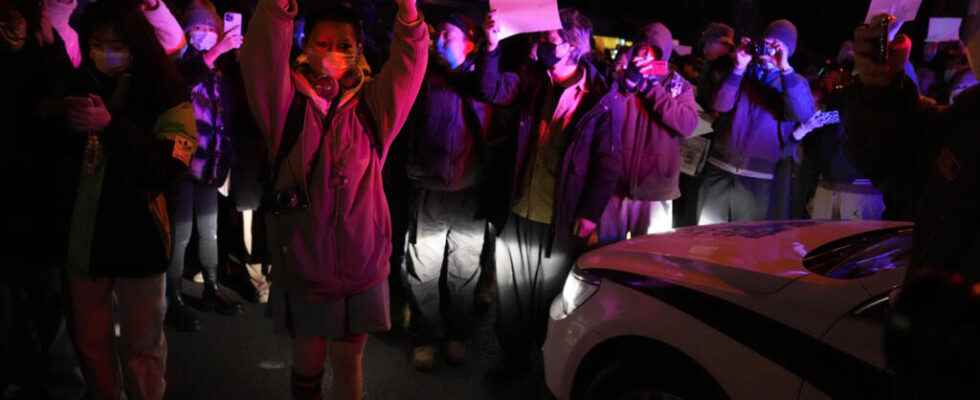Yang Zijing had been arrested in December, after taking part in protests against the zero-Covid policy in Guangzhou. Like her, many young Chinese women were present in the processions.
From our correspondent in Beijing,
After 30 days in pre-trial detention, the 25-year-old and six other protesters were released earlier this week, according to AFP information. Yang Zijing, who identifies as non-gendered, took part in a demonstration on November 27 to denounce the repeated confinements of Haizu, the district then most affected by the epidemic in Guangzhou.
It is also in this same district that ten days earlier, another young woman had been tied up in the middle of the street by the health brigades. Kneeling, looking proud, the image of the latter continues to tour the networks in China. Since then, no news from her. No news either from the student of the Nanjing Media and Communication Institute, among the first to brandish a white sheet to silently shout her anger.
Yang Zijing, like other released protesters, is required to stay in their hometown for a year and report to the police regularly. Some protesters claim that their phone was hacked, that they have been asked not to speak to the media and that they remain under close surveillance.
The fed up of Chinese youth
Because the November demonstrations were more than demonstrations against zero-Covid. The youth, particularly affected by three years of health restrictions, also expressed their fed up with the discrimination to which some of these young people are subject. Result: the MeToo and LGBT movement were particularly targeted in the repression that followed. During the interrogations, officers mocked long-haired men calling them gay “, indicates the washington post.
Accused of “causing disturbances to public order” and of collusion with “hostile forces from abroad” – an argument often used by the authorities during “mass incidents” – the protesters also suffered insults online. There are no official figures on the number of people detained after the protests, as the Chinese government has not acknowledged the arrests.
Over a thousand Weibo accounts censored
According to Weibo, this is to punish personal attacks and incitement to hatred. The challenge to China’s anti-Covid policy prompted moderators to suspend 1,120 accounts, including those of some very popular personalities.
With for example that of Liu Chun, director, producer and media baron, has 12 million subscribers. On December 17, he wondered in a message published on Weibo. “ How come fever medications are out of stock? If someone had taken care of the production and logistics in advance, this would not have happened “. A comment that will earn him the deactivation of his account, because it is this kind of sentences that Beijing no longer wants to read.
This is what the Chinese Communist Party calls “ using the pandemic to disturb public order “. Now that Xi Jinping has given in after the November protests and suddenly dropped extremely strict health measures, there is no question of questioning his authority once again.
